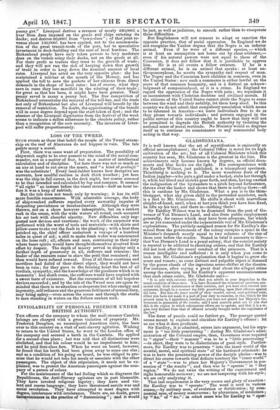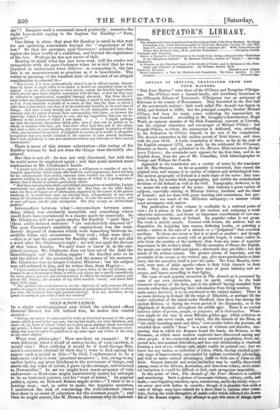GLADSTONIANA.
IT is well known that the art of mystification is eminently an official accomplishment ; the Colonial Office is noted for its high cultivation of the art ; but of all Colonial Ministers which this country has seen, Mr. Gladstone is the greatest in the line. His achievements only become known by degrees, as official docu- ments and blue books see the light. His correspondence with Sir Eardley Wilmot, just published, is a triumphant specimen. Thimblerig is nothing to it. The more wondrous feats of the Indian juggler—who puts a girl under a basket, stabs her through it, while her blood and shrieks pour forth, and then, having excited the indignation of the bystanders to a pitch beyond forbearance, throws over the basket and shows that there is nothing there—all this is outdone by Mr. Gladstone. What a pea is to the thim- blerigger, what any given child to the pretended murderer, such is a fact to Mr. Gladstone. He shifts it about with marvellous sleight-of-hand, until, when at last you think you have him fixed, he lifts up his text, and there is—nothing there !
Sir Eardley Wilmot was to be dismissed from the post of Go- vernor of Van Diemen's Land, and also from public employment generally, for causes which may have been adequate, but which are as yet concealed under the impenetrable veil of Mr. Gladstone's explanations. The publicly-assigned reason for Sir Eardley's dis- missal from the government of the colony occupies a space in the Minister's despatch nearly equal to two columns of the size of those now before the reader. Stated in brief it amounts to this— that Van Diemen's Land is a penal colony, that the convict society is reputed to be addicted to shocking crimes, and that Sir Eardley did not look after the moral conduct of the prisoners. That is a reason intelligible and sufficient : it is only when you come to look into Mr. Gladstone's explanation that it begins to grow ob- scure and remote; as some distinct and palpable object is dimmed by the gauze clouds of the ingenious scene-shifter at the theatre. For instance, after saying a great deal about the alleged crime among the convicts, and Sir Eardley's apparent unconsciousness that such crime exists, Mr. Gladstone says-
" It is only with extreme rarity that you advert in your despatches to the moral condition of these men. You have discussed the economical questions con- nected with their maintenance or their coercion, and you have even entered into argument, though in a manner too little penetrating, upon their offences against the laws. But into the inner world of their mental, moral, and spiritual state, either you have not made it a part of your duty to examine or else, which for the present issue is, I apprehend, conclusive, you have not placed her Majesty's Go- vernment in possession of the results; and I need scarcely point out to you that this is the region in which reformatory efforts are to operate, and that it is a re- gion very distinct from that of offences actually brought under the cognizance of the law."
The force of puzzle could no further go. The passage quoted seems meant to explain and elucidate Sir Eardley's offence : let us see what it does predicate.
Sir Eardley, it is admitted, enters into argument, but his argu- ment is "too little penetrating " : during Mr. Gladstone's admi- nistration of the Colonial empire, then, Governors were required to "argue"—their "manner" was to be a "little penetrating" —in short, they were to be dialecticians of good style. Further- more, Sir Eardley was to penetrate "into the inner world of the mental, moral, and spiritual state " of the hardened criminals: he was to have the penetrating power of the dactyle pholas—was to direct his course towards that definite territory the inner world" of a " state "—was to ,place her Majesty's Government in pos- session of " the results"; ; and then was to " operate " in "that region." We do not twist the writing of the experienced and right honourable reviewer ; we are not tampering with his style; we are only analyzing it. That last requirement is the very crown and glory of exaction: Sir Eardley was to "operate." The word is used in various senses,—by military men, of evolution or fortification; by com- mercial men, of money manoeuvres; by physicians, of medicines ; by "&c. of " &C.° : in which sense was Sir Eardley to "op.
DM"? Imagine such a command issued positively ; conceive the right honourable saying to the hapless Sir Eardley—" Now,
operate !"
One thing is clear, that poor Sir Eardley is rated in this way for not operating somewhere beyond the "cognizance of the law." So that his province, poor Governor! extended into that region the inner world of a condition, and beyond the cognizance of the law. Perhaps he was not aware of that. Bearing in mind what has just been read, will the reader not sympathize with the poor Governor when he is told that he was required to understand what follows : so comparing it, the last line is an announcement as gracious as it is inscrutable. The writer is speaking of the reported state of crime and of an alleged
combination to conceal it—.
"This is not, it is true, systematically stated to me in official reports, because i those by whom t ought either to be stated or denied are altogether silent on the matter. I am not able to judge to what precise extent the horrible impressions which prevail upon these subjects correspond with the fact, or how far they may be referable to apprehension magnified through obscurity. But from the evi- dence before me, fragmentary and indirect, though, I regret to add, too concordant as it is, I can entertain no doubt of so nittch as this' that the ideas to which I refer have a foundation, and that of no inconsiderable breadth, in the real state of things. And here I must broadly and once for all distinguish as between the rumours and the extent of actual facts corresponding with them ; so between the inactivity which I have to impute to you, and any supposition that you are in- different to the horrors of which I now speak. - - - - I might, perhaps, say that the rumours themselves which exist, even if they can beproved to be wholly at variance with fact, yet, from their effect both here and in the colony, had such a claim on your attention, that your entire disregard in practice of that claim, has amounted to an error of judgment so serious as to render it altogether inexpedient that you should continue in the exercise of your present functions. But I look exclusively to acts and omissions without any reference to their mental counterparts."
There is more of this inverse exhortation—this rating of Sir Eardley because he had not done the things thus distinctly elu- cidated.
But that is not all : he was not only dismissed, but told that he could never be employed again ; and that point merited more explanation at Mr. Gladstone's hands.
"I should have felt authorized to express a willingness to consider of any fa- vourable opportunity which might offer itself for such employment, had it not been for the circumstance that certain rumours have reached me from a variety of quarters relating to your private life, to the nature of which it is perhaps unne-
that I should at present particularly allude.
cel'affad these rumours been slight, and without presumptions of credibility, I might warrantably and gladly have passed them by. Had they, on the other hand, taken the form of charges or of information supported by the names of the parties tendering it, it would have been my absolute duty, independently of any other reason for interference with your tenure of office, to refer the matter to you, and at once call upon you for your exculpation. But they occupy an intermediate position." Intermediate between what I—intermediate between some- thing which was absolutely incredible and something which nroidd have been tantamount to a charge made by somebody. So Mr. Gladstone will not again employ Sir Eardley "until they" [these oddly-defined rumours] " are satisfactorily disposed of." The poor Governor's condition of employment was the satis- factory disposal of rumours which were something between in- credible fables and accusations. Very well:; what were they ? .-,-that is at last the question Sir Eardley asks. We will not add a word after Mr. Gladstone's reply; we will not spoil the flavour Of that bonne bouche. We only want to know if, in the sub- joined passage, Mr. Gladstone does not beat out of the field the thimblerigger and the Indian juggler ? Sir Eardley asks to be told the nature of the accusation, and the names of his accusers. Mr. Gladstone was no longer Colonial Minister ; but the subject was still referred to him, and he writes thus, from Hagley- "I have received from Lord Grey a copy of your letter of the 5th October, ad- dressed to me as Secretary of State, in which you adjure me to specify immediately the dates, places, persons, and circumstances, to which the rumours against your private life forming the occasion of my letter marked secret,' and dated 30th April 1846, apply. "The persons who made known to me the existence of such rumours did not profess to support their credit by any statements of particulars of the kind to which you refer, but to found them upon general notoriety. It is not, therefore, in my power to convey to you what I have not received?'



























 Previous page
Previous page